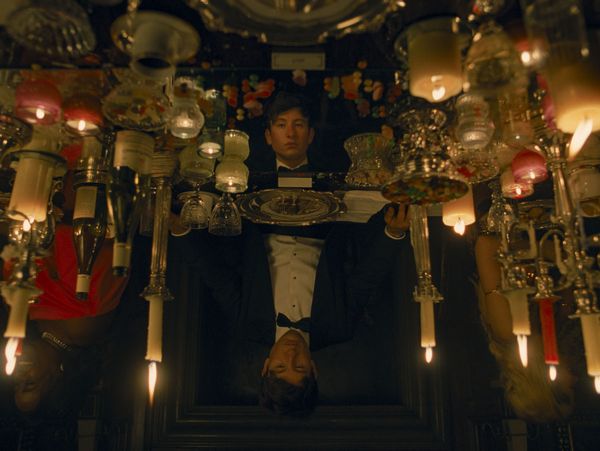
"Saltburn" is a satirical take on the lustful pursuit of wealth through one man's attempts to acquire a life of privilege by proxy.
Oscar-winning writer-director Emerald Fennell depicts Oliver (Barry Keoghan) as a poor scholarship student at Oxford University in the mid-aughts. In his first couple of weeks at school, Oliver is an outcast who longs to befriend the school's most popular, rich and attractive guy, Felix (Jacob Elordi) and succeeds in getting drawn into that new circle of friends. They establish a close, slightly homoerotic relationship, and after tragedy strikes in Oliver's family's he's invited to spend the summer at Felix's sprawling family estate called Saltburn. Oliver is therefore transported to an elite new world, gaining entrance to the life of wealth he's longed for.
Even though Fennell attempts to make the audience sympathize with Oliver, it does not quite land because of the movie's ending that undoes the groundwork that was laid out. But there is another character who is more fascinating than Oliver: Felix's cousin Farleigh (Archie Madekwe) whose background would have made for a better more satisfying antihero in the end.
Here's why Oliver ultimately fails the audience, while Farleigh could've been the one to take "Saltburn" to the next level:
Oliver's betrayal
It should be noted that there are only a few moments where the audience actually feels bad for Oliver. In the beginning of the film, there are many scenes where he sits alone in a library or dining hall pining for friends. But when he finally gains Felix's friendship, it's because Oliver is able to get vulnerable and share his experiences growing up with abusive and neglectful addicted parents and that he lost his father to that addiction. Felix is there for him and comforts him as any good person would.

When Oliver's estranged mom calls on his birthday, Felix answers on his behalf and secretly schemes to take Oliver back to his hometown so they can reconcile. The impromptu road trip takes the friends to a high middle class neighborhood that looks pristine. The image that Oliver's painted shatters when his warm and lovely mother greets them both. Felix is shocked and perplexed to learn Oliver's father is not only alive, but is also kind and respectable. Not only that, Oliver has siblings even though he claimed to be a sad, only child. In this scene, Oliver loses whatever sympathy he's gained from the audience and Felix, whom feels betrayed and manipulated. Oliver is cosplaying as the poor son of drug addicts for attention. In that instance, he becomes just as unethical as any grifter.
Enter Farleigh, the family hanger-on
As Felix's cousin, Farleigh always comes second string. They run in the same social circle at Oxford, and he initially appears just as thoughtless and airheaded as his cousin at times. Farleigh seems only really focused on coasting through school and partying. He is in the same one-on-one essay sessions with Oliver and their professor, but Farleigh gets out of doing schoolwork by talking about his mom whom the professor used to have a crush on. Oliver sits in the room quietly, watching and hating from the outside. But this is part of Farleigh's appeal; he's popular, loud and takes up space because he has to.
But Farleigh isn't a part of the clique because of his personhood – it's only because of his association with Felix. Farleigh is different from most Oxford students because of his nationality. He's American, and it shows in his dry Northeast accent. But he was also raised in America with his mom who is still there. He really has no home with the people who are his extended family at Saltburn and he knows this and is careful to never ruffle any feathers. While he may have an aristocratic British family, he knows that they'll only ever see him as the American cousin.
Farleigh's race also plays a large role in his outsider status. As the only Black person in his circle of friends at Oxford and the only Black family member who is at Saltburn, Farleigh must play nice . . . or at least tries to in order to not be perceived differently, but it proves to be difficult. In one heartbreaking scene, Farleigh is all but begging his rich cousin for more money that he can send to his mom. But Felix refuses, and Farleigh retorts that of course he couldn't understand his plight as the only non-white person in their family. Felix scoffs at the accusation, but Farleigh points out that Felix doesn't even know the name of the family's Black footmen.
Farleigh is an economic outsider as well. His mother struggles with money in America and is practically disowned by the family. Meanwhile, Farleigh is depending on Felix's family for everything. They pay for his schooling, and he stays with them at Saltburn when his aunt and uncle can put him out with the snap of their fingers (and have done with another parasite who has overstayed her welcome). When he begs Felix for money, he is denied. Farleigh knows his social and economic ranking falls low in the hierarchy of his white family and does his best to play the part of someone who is as rich and privileged as them, so as not to attract their attention.
Oliver vs. Farleigh
Therefore, Farleigh was the outsider who infiltrated Saltburn way before Oliver did – and that’s why he can see through Oliver's lies and grift. Oliver is actually threatened by Farleigh because he’s the only person who can see it's all an act to get close to the wealth. After all, the truly marginalized person, Farleigh, knows what that experience is and can tell when a fraud is a fraud.
Actor Archie Madekwe said about his character, “He recognizes someone on the outside looking in, like him. This is not Farleigh’s world. One, he’s not English. Two, he’s the only person of color. Three, he’s queer. Four, he is not wealthy. It’s all of these things that don’t make him part of this world, and all of a sudden this outsider has come in and has potentially taken the place of him. And then he ends up in his house, and that’s when the threat comes too close.”

You dress me up, I'm your puppet
You buy me things, I love it
You bring me food, I need it
You give me love, I feed itAnd look at the two of us in sympathy
With everything we see
I never want anything, it's easy
You buy whatever I needLook at my hopes, look at my dreams
The currency we spent
I love you, you pay my rent
I love you, you pay my rent
Oliver knows that Farleigh is an increasing danger to his standing at Saltburn when Farleigh tips his hand, telling Felix that Oliver hooked up with his sister Venetia (Alison Oliver). In turn, Oliver sets up Farleigh by framing him via email and gets him kicked out of Saltburn. Ultimately because Farleigh is a grifter too, he finds his way back . . . but when Felix ends up dead, Oliver once again points the finger at his rival and eventually gets Farleigh permanently kicked out of Saltburn and cut off from their finances.
Who deserves to take Saltburn
After Felix, each Saltburn family member dies . . . and somehow Oliver eventually is victorious and inherits Saltburn. Through flashbacks, the audience learns that he's been scheming from the very first moment Felix befriends him, and orchestrated every tragedy that eventually becomes his windfall. His celebratory nude dance through the halls of Saltburn is joyous, and presumably the audience is mentally high-fiving him for being able to pull one over on the financially rich but virtuously bankrupt.

But nothing changes once he inherits Saltburn. He will continue to live a life of greed, excess and unearned wealth just like Felix's family. His silly traipsing through the halls shows us this frivolous mindset.
But we can only imagine that if someone like Farleigh inherited the prize that was Saltburn, because of his true outsider status he would potentially use his wealth for good . . . or at least differently from how Oliver does. It's not a guarantee but there's a higher chance that Farleigh would try to change the way the family ran the estate. Maybe he would pay the staff more, promote the Black footmen or at least give them some better treatment. It is possible that he would make Saltburn a safe haven for marginalized people just like him because he's known hardships that Oliver hadn't. He could finally be accepted into a family he made for himself that looks like him and embraces his outsider status as a Black American queer working class person.
Ultimately, Fennell's premise falls flat because the story is told through the perspective of someone who doesn't have the range to fairly depict what being an outsider looks like. It is a missed opportunity because Farleigh was there the whole time, and was the right antihero for the role. It would have been a more satisfying and complete ending if the man who's been codeswitching his whole life to fit in ended up with the prize. He would have flown under the radar and beat the system despite the circumstances of his birth and lack of privilege.







